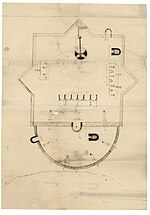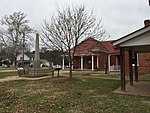Flowerdew Hundred Plantation

Flowerdew Hundred Plantation dates to 1618/19 with the patent by Sir George Yeardley, the Governor and Captain General of Virginia, of 1,000 acres (400 ha) on the south side of the James River. Yeardley probably named the plantation after his wife's wealthy father, Anthony Flowerdew, just as he named another plantation "Stanley Hundred" after his wife's wealthy mother, Martha Stanley. (Yeardley's wife, Temperance Flowerdew, came from English gentry in the County of Norfolk.) A "hundred" was historically a division of a shire or county. With a population of about 30, the plantation was economically successful with thousands of pounds of tobacco produced along with corn, fish and livestock. Sir George paid 120 pounds (possibly a hogshead of tobacco) to build the first windmill in British America. Today, Flowerdew Hundred plantation is a private residence.
Excerpt from the Wikipedia article Flowerdew Hundred Plantation (License: CC BY-SA 3.0, Authors, Images).Flowerdew Hundred Plantation
Flowerdew Hundred Road,
Geographical coordinates (GPS) Address Nearby Places Show on map
Geographical coordinates (GPS)
| Latitude | Longitude |
|---|---|
| N 37.296111111111 ° | E -77.104166666667 ° |
Address
Flowerdew Hundred Road (State Route 639)
Flowerdew Hundred Road
23860
Virginia, United States
Open on Google Maps








